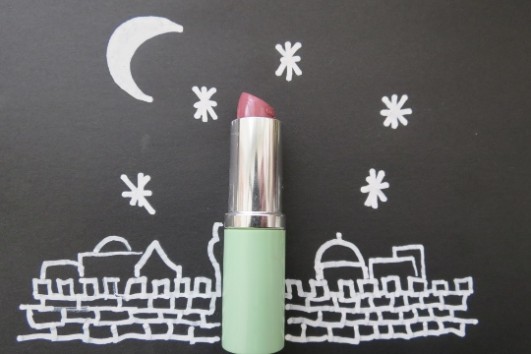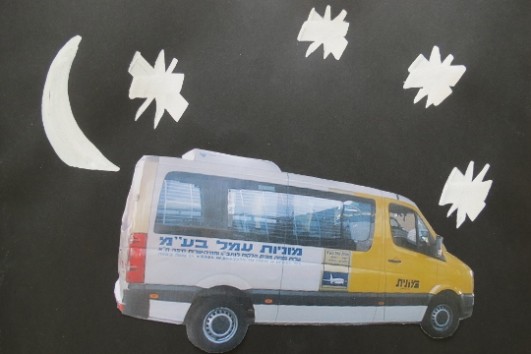Part two. Following the attack, our night owl returns to Jerusalem in drag for a rally, and walks into an emotional pitfall.
For other nights click here.
Someone else was murdered on Thursday, the night of the Jerusalem Pride stabbing. In the northern West Bank village of Duma, a group of hooded men, most likely members of the extremist Jewish “Price Tag” cell, set fire to two family homes and left threatening graffiti in Hebrew on the walls. A baby, Ali Dawabsheh, was burned to death. His parents and bother were rescued but remain in an Israeli hospital in critical condition.
Both the Jerusalem and Tel Aviv LGBT communities organized rallies in the wake of the pride stabbing, to be held on the following Saturday night. I decided to go to the one where little Ali was most likely to also be mentioned. That was clearly going to be Jerusalem.
Organizers at Tel Aviv courted mainstream politicians, some of whom participate in hateful discourse. The Jerusalem team booked Israel’s president Reuven Rivlin, the only high ranking Israeli politician who speaks consistently against all forms of intolerance. Sadly, the Israeli presidency is only a ceremonial position which has little impact on the system.
I got back in drag and took the minibus to Jerusalem with a sign I had made. It read: “Pride-stabbers and baby-killers all heed the same call.” I raised it high as Rivlin spoke and heard him say just that, in different words. He mentioned the murder at Duma in his first sentence. Other speakers followed him onstage, including three rabbis, two of whom also mentioned Duma. I was in the right place and I was in tears.
She should give me a break
Tears returned to my face later, further demolishing my eyeliner. After the rally, I sat with my friend, Irit, at “Hataklit,” a casual West Jerusalem bar. I told her a story that involved another friend of mine, and mentioned that she is Palestinian.
“Where is she from?” Irit asked.
“From Haifa.”
“Oh, that’s very convenient, to call yourself a Palestinian when you live in Haifa.”
The concept of “Israeli Arabs” tends to be highly contrived in the eyes of the people we label with it. Irit, a journalist, surely knew this. She made a political statement. I decided to skip giving her the lecture and go straight for the heart.
“It’s not so convenient for her. Her brother was killed by the police in October 2000. He was demonstrating peacefully. This only happens to Palestinians, whether they are citizens or not, never to us.”
“I’m very sorry about her brother, but she should give me a break.”
“Look,” I insisted, “If this country taught me anything, it is never to choose people’s identity for them. And if we’re already at it, could I ask something of you? I am in a feminine persona right now. You hear me speaking in the feminine, yet you have been referring to me in the masculine since the evening began. You are picking my gender identity. I understand if it isn’t a simple switch, but I’d appreciate it a lot.”
In English that may make little sense, but in Hebrew every word is gender specific, and so, to me, every word Irit said betrayed a lack of acceptance.
She gave me a look I didn’t like. “There’s something I’ve been wanting to tell you about this whole drag thing,” she said.
Easy to play this game
“What?”
“Never mind.”
“Go on, say it.” I knew this would hurt. Irit is not famous for being tactful. I held my purse, ready to get up and leave if it hurt too badly.
“Well, I was just thinking how easy for you to play this game. After all, you being a privileged white male.”
Jesus. Game? Privilege? Easy? “Do you have any idea what price I pay with my family to live the way I do? What price I pay with society? I was almost murdered two nights ago.”
I have never been so offended. Though always in an emotionally vulnerable state when en-femme, I can usually control myself. But after this awful weekend I couldn’t. I picked up my glass of gin and tonic and threw it to the ground. It shattered. I left.
Anger took me around the block. How many years have I known Irit? How many times has she seen me cross dress? Did she always judge me? I let myself feel so comfortable with her, despite her natural misanthropy.
Though humiliated, I also felt horrible for losing my temper. I called Irit to apologize. She didn’t pick up. I texted her, then called Ruthie and lost my wits again on the phone. It was just terrible. I went back to the bar, which Irit had left, and tried to pay for the glass. They wouldn’t let me. I left and sat on a stone, wailing and tried to calm down.
Gluing the heart up with Arak
“Hataklit” is situated in Jerusalem’s Russian Compound, not three blocks away from the ultra-Orthodox quarters through which I strolled the night of the assault, feeling so accepted. Now I felt very uncomfortable in a blouse and high heels. I ached to switch back into my male persona, but couldn’t. My shorts and sandals were in another city. I wanted to head into the desert and vanish. I wanted to flee far, hundreds of miles away, but my country’s tightly watched, frequently impassable borders would not allow for it.
The country. It was getting to me, hard. Even I acted with violence
My phone buzzed twice. Irit texted. She suggested we take a few days to calm down and then talk again.
Another was from my Jerusalemite friend, Efrat, who was also having a bad night and suggested we meet for a drink.
What ensued is what somehow always happens in this place. First it breaks us to bits, then we pick ourselves up and glue our hearts back together with Arak. Efrat was cool and understanding, the best imaginable company for such a night. I was too self-conscious to go to a straight place, so we went to the “Video,” Jerusalem’s only gay bar, and danced there to Lena’s “Sattelite,” Germany’s 2010 Eurovision winner, and to Beyonce and Macklemore and some Kanye, and I forgot, a bit.
Guys
The way to get back from Jerusalem after dancing till 2:30 in the morning is by “sherut” minivans, which only move once ten passengers have piled in. As I arrived, three were lounging outside the sherut besides the driver. We would have to wait for six more.
When people meet, they first make a gender based classification: is this a man or a woman? In the Holy Land, that is immediately followed by the question of ethnicity: is it a Jew or an Arab? And what kind of Jew, or what kind of Arab? The prospective passengers were all men in their twenties or early thirties. One was Palestinian, one an Ethiopian Jew and the third an Ashkenazy Jew with a yarmulke knit in the fashion of religious Zionists. They looked at me and saw… well, whatever they chose to see.
It was getting later than late and the driver offered a deal: we could each pay a bit more than the usual fare and take off without delay. We agreed. Then, as soon as we left the curb, three other passengers appeared and were charged the usual fare. The Ashkenazy passenger got mad. The driver explained that the newcomers were not in on the deal and couldn’t be charged more. The Ashkenazy wouldn’t have any of it. “I’m a lawyer,” he warned, “So you better not argue with me.” He demanded that the driver return the 20 shekel difference to each of us, though no one cared but him.
At one point, the Palestinian approached the driver and brokered a compromise, which consisted of a ten shekel refund to the lawyer. He returned to his seat and found that the Ethiopian had taken it. The Palestinian started yelling at the Ethiopian to vacate the aisle seat, but the Ethiopian wouldn’t. Finally I got up up from my own aisle seat and offered it to the displaced Palestinian, just to get some peace.
I moved back a row and sat by a girl. Up front, arguing resumed. The lawyer changed his mind about the ten shekels. The others took sides and were being loud about it. I have by now been woman for long enough that I leaned over to my neighbor and mutter: “guys.”
She nodded, and this is where the evening got interesting.
I don’t need help
She was 22 years old and spoke with a barely noticeable, but nonetheless noticeable, Russian accent. She grew up and lived in of the most neglected cities in the south of the country and she had every reason in the world to bitch about men.
“I used to be engaged,” she told me, “but then I caught my fiancée with my best friend.”
“Holy smokes!”
“Yes, and I was five months pregnant at the time.”
“Shit!”
“As you can imagine. I never let him see the kid, not once.”
“Is it a boy or a girl?”
“A boy. He’s one and half years old. I raised him and I’ll go on raising him and I don’t need help. I have my mother. She gave birth just a half a year after I did, so we’re raising the kids together.”
This was a story that came from the most difficult corners of the Israeli experience. Two generation of single mothers living in a southern development town built for Jewish immigrants with “less than desirable” roots, in an industry city where industry never took root. This is the kind of story that I, as a privileged white male, would only hear if I chose to take public transportation.
And I really am privileged. Irit is, of course, right. Despite my queerness, I represent one of the most empowered groups in the steep pyramid of ethno-social hierarchies. This young mother did not blame me for that, for my natural circumstances. She spoke to me openly and in the feminine, and told me things she would tell a woman. She accepted me for what I was, at that moment, and in general. I was deeply in her debt.
The Jackals
Stepping off the sherut in south Tel Aviv, I began making my way home. The street was well lit, yet I felt very uncomfortable. Nearly every car that passed honked at me. The drivers went too fast to notice my actual gender. I had no doubt that they considered me an actual woman and thought honking at a woman at 3:30 AM a much better idea than leaving her in peace and respecting her need for security. A car stopped at the light not far from me. The two men inside made jackal-like howls at me before taking off again.
If there’s any value in my cross gender experience, here it was. This is what a woman goes through when walking through my city at night. It was more severe than I had anticipated. It was sick enough to make you hate humanity.
It’s been such a sick weekend. Hasn’t it? People were stabbed before my eyes, a baby was set on fire in the name, of all things, of my national identity and religion. Night is such a fitting theme for this diary. We are at night. It’s a sense so many of my friends share these days. This is Israel’s political night. At least I can change back into man tomorrow and not face it as a woman on her own. That would have been so much harder still.
(Continues here)



